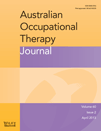Critically Appraised Papers
There is no evidence to support or refute the effectiveness of memory rehabilitation on memory function or functional abilities in people with multiple sclerosis
First published: 01 April 2013
No abstract is available for this article.
References
- Amato, M. P., Zipoli, V. & Portaccio, E. (2006). Multiple sclerosis-related cognitive changes: A review of cross-sectional and longitudinal studies. Journal of the Neurological Sciences, 245, 41–46.
- Gullo, H. L., Fleming, J., Bennett, S., Gullo, M. J. & Shum, D. (2012). Probing the complex interplay between executive dysfunction, depression and physical/cognitive fatigue in multiple sclerosis using structural equation modelling. Multiple Sclerosis Journal, 18, 693–693.
- das Nair, R., Ferguson, H., Stark, D. L. & Lincoln, N. B. (2012). Memory rehabilitation for people with multiple sclerosis. Cochrane Database of Systematic Reviews, 3, Art no: CD008754, doi: 10.1002/14651858.CD008754.pub2
- Prosiegel, M. & Michael, C. (1993). Neuropsychology and multiple sclerosis: Diagnostic and rehabilitative approaches. Journal of the Neurological Sciences, 115, s51–54.
- Shum, D., Fleming, J., Gill, H., Gullo, M. & Strong, J. (2011). A randomised controlled trial of prospective memory rehabilitation in adults with traumatic brain injury. Journal of Rehabilitation Medicine, 43, 216–233.
- Wilson, B. A., Cockburn, J. & Baddeley, A. (2003). Rivermead Behavioural Memory Test-Version II (RBMT-II). San Antonio, TX: Pearson.




